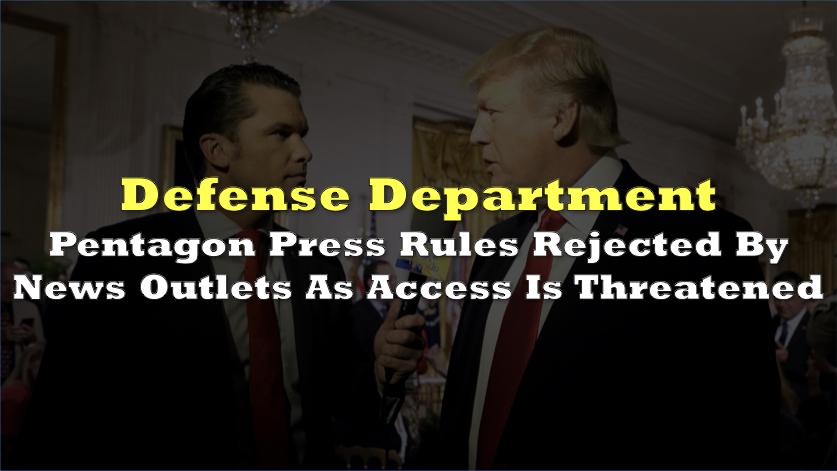At least 18 news outlets including The Washington Post, The New York Times, The Wall Street Journal, The Associated Press, Reuters, CNN, NPR, The Guardian, The Financial Times, The Hill, and Politico said they would not sign the Defense Department’s new press policy by the set deadline, triggering a 24-hour clock to turn in badges and vacate Pentagon facilities.
The policy requires media representatives to acknowledge restrictions that, as summarized in the document circulated to reporters, forbid obtaining or soliciting any information the Pentagon has not explicitly authorized. Outlets declining to sign cited First Amendment concerns and the immediate operational consequence: anyone not signing by the deadline must surrender credentials and clear out within one day.
Matt Murray, executive editor of The Washington Post, said the rules “undercut First Amendment protections by placing unnecessary constraints on gathering and publishing information,” adding the paper “will continue to vigorously and fairly report on the policies and positions of the Pentagon and officials across the government.”
New York Times Washington bureau chief Richard Stevenson said the policy “constrains how journalists can report on the US military, which is funded by nearly $1 trillion in taxpayer dollars annually,” arguing the public “has a right to know how the government and military are operating.”
The Pentagon Press Association, which represents the Pentagon press corps, condemned the policy after the document’s prohibitions were expanded following initial pushback. The association said the restrictions would “gag Pentagon employees and [threaten] retaliation against reporters who seek out information that has not been pre-approved for release,” and has retained counsel.
Military Reporters & Editors urged journalists not to sign, calling the rules an “unprecedented attack on the First Amendment.”
Pentagon spokesperson Sean Parnell countered that outlets had “decided to move the goal post,” asserting the document does not require agreement with the policy, only acknowledgment of understanding. He criticized reporters for speaking out, even as newsroom leaders emphasized that compelled acknowledgments tied to access function as de facto prior restraint on newsgathering.
It really is great to see that almost all news outlets, whether they lean more Conservative or Liberal, at least the ones who still have a shred of dignity left, agree how important it is to totally reject this clear attack by the administration against the First Amendment. https://t.co/q5MZCjZwD0
— OSINTdefender (@sentdefender) October 14, 2025
Conservative outlets supportive of the administration also refused. A Newsmax spokesperson said, “Newsmax has no plans to sign the letter,” noting the network is working with other media to resolve the impasse.
Washington Times president and executive editor Christopher Dolan wrote, “No, our reporters will not be signing.” Washington Examiner editor Hugo Gurdon said his outlet “does not sign agreements with people we cover… and we do not plan to make an exception in this case.”
Fox News, Hegseth’s former employer, had not said whether it would sign as of the latest statements in the notes.
The lone exception was One America News: “After thorough review of the revised press policy by our attorney, OAN staff has signed the document,” OAN president Charles Herring said, emphasizing the word “revised.”
Former senior officials and press groups also criticized the policy. John Ullyot—who, as a Pentagon spokesman early in the Trump administration, signed the memo removing established media from dedicated offices—urged Secretary Pete Hegseth to “drop the Soviet-style restrictions, reopen the briefing room and… engage regularly, confidently and conversationally with reporters of all stripes.”
Reporters cited a pattern of reduced access under Hegseth: the Pentagon has sharply limited formal briefings and movement inside the building. A statement from Military Reporters & Editors noted, “Secretary Hegseth has not briefed Pentagon reporters in nearly four months, and Press Secretary Kingsley Wilson has not conducted a briefing in two months,” while US forces operate globally and the department has undertaken legally contested strikes.
Statement includes:
— Dan Lamothe (@DanLamothe) October 14, 2025
"Secretary Hegseth has not briefed Pentagon reporters in nearly four months, and Press Secretary Kingsley Wilson has not conducted a briefing in two months. The Defense Department has avoided questions from the press, all while U.S. troops are operating… https://t.co/0LeSw4DTrk
The Pentagon says the form is an acknowledgment, not an agreement. Media leaders argue the acknowledgment, tied to access and containing expanded prohibitions, functions as a prior-restraint mechanism.
Information for this story was found via The Washington Post and the sources mentioned. The author has no securities or affiliations related to the organizations discussed. Not a recommendation to buy or sell. Always do additional research and consult a professional before purchasing a security. The author holds no licenses.









